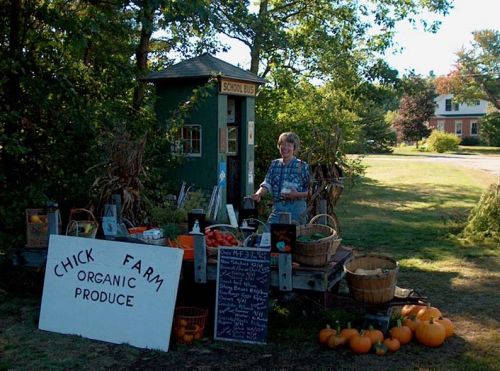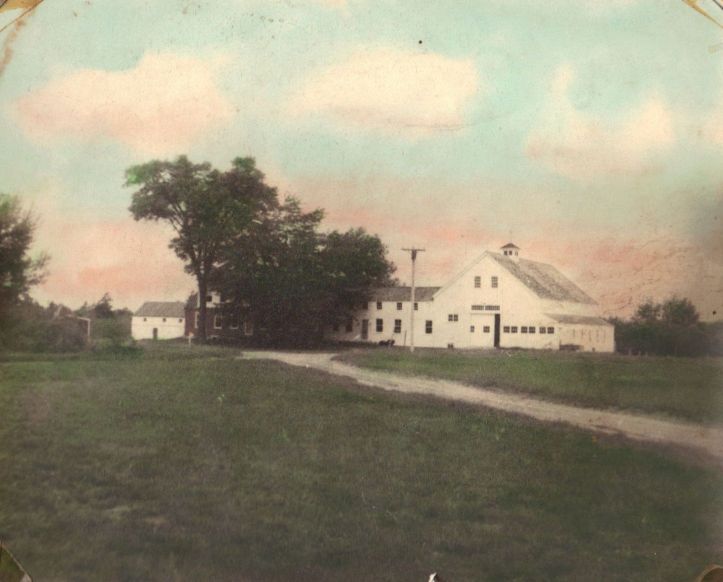 Our farm has been a Chick family homestead since at least the 1700s.
After a long-time commercial egg operation ended in 1975,
the farm sat idle until we revived it in 2001.
At first we raised a few mixed vegetables and sold them
from a roadside stand.
In 2002 we were certified organic by
MOFGA
and started selling our vegetables and eggs at the
Kennebunk
Farmers' Market.
Over the next few years we joined the farmers' markets in Wells and York
and started a Community Supported Agriculture (CSA) program
that at one point provided vegetables and berries to over 50 families.
We raised meat rabbits for a few years
and in 2007 we added pastured poultry to our operation.
Our farm has been a Chick family homestead since at least the 1700s.
After a long-time commercial egg operation ended in 1975,
the farm sat idle until we revived it in 2001.
At first we raised a few mixed vegetables and sold them
from a roadside stand.
In 2002 we were certified organic by
MOFGA
and started selling our vegetables and eggs at the
Kennebunk
Farmers' Market.
Over the next few years we joined the farmers' markets in Wells and York
and started a Community Supported Agriculture (CSA) program
that at one point provided vegetables and berries to over 50 families.
We raised meat rabbits for a few years
and in 2007 we added pastured poultry to our operation.
In early spring of 2010, Marilyn's nagging shoulder problem suddenly got much worse, forcing us to cancel our CSA program for the season and take a hard look at our farm operation. As much as we enjoyed our CSA program and its dedicated members, we came to realize that raising mixed vegetables was not the best use of our very sandy farmland. In the true spirit of organic farming (Work with nature instead of against it!), we doubled our pastured poultry operation and shifted our crop production toward plants that do well on sandy soil, such as asparagus and berries. This strategy – and shoulder surgery – got us back on track for several more years of producing good food. In 2020 we retired from farming and now just have a few hens and a small garden.
The Early Days According to family history, the original Chick family land grant in South Berwick, Maine, granted by the King of England, dates back to the 1660s. Several family members settled in the northern corner of Wells, just across Branch Brook from what is now West Kennebunk. This area was at one time called Chicksville but later became known as Wells Branch. The family name lives on in the road that runs by our farm – Chick's Crossing Road was named for the railroad crossing that once served this part of town.
 Farmstead Buildings
The first dwelling at Chick Farm was a log cabin located
somewhere in the field in front of our house.
When the cabin was burned down by Indians,
the Chicks built a wood-frame house situated in what is now
a wooded area on the corner of Waldo Way and Chick's Crossing Road.
In 1846 the family built the brick cape we live in today,
with all the rooms on the first floor
so they could escape in case of fire.
Farmstead Buildings
The first dwelling at Chick Farm was a log cabin located
somewhere in the field in front of our house.
When the cabin was burned down by Indians,
the Chicks built a wood-frame house situated in what is now
a wooded area on the corner of Waldo Way and Chick's Crossing Road.
In 1846 the family built the brick cape we live in today,
with all the rooms on the first floor
so they could escape in case of fire.
We believe the main barn (the one that's now attached to the house) was built around the same time. Later additions included a shed to connect house to barn, a dormer on the front of the house, and an expansion of the barn. (From the construction techniques visible inside, it's clear that the rear third of the barn was added on.) The other buildings – three chicken houses and a blacksmith shop – were all built in place or moved to the farm in the early 1900s. The picture you see here (taken in the 1930s?) shows the farmhouse and attached barn. To the left you can also see a white clapboard shed that had originally been attached to the house as a summer kitchen. At some point before this picture was taken, the structure was moved to its present location.
Waldo Chick's Legacy Waldo Chick was born in this farmhouse in 1903 and died here in 1988. He was one of the first graduates of Wells High School, traveling by horse an hour each way to complete his education. Waldo had a mechanical bent and dreamed of going to college to study engineering, but when his father died he abandoned his college plans and stayed home to run the farm and care for his mother and two sisters.
Waldo sold off the dairy cattle and concentrated on chickens, calling his business Chick's Poultry Farm. In the 1920s he had 6000 chickens, a sizable operation for the times. By the 1940s Waldo had become a major figure among poultry producers. In 1950 he was elected president of the Northeastern Poultry Producers Council and a delegate from Maine to the American Farm Bureau Federation.
Chick's Chicken Barbecues It was around this same time that Waldo got involved in chicken barbecues as a way to promote poultry. It started with Belfast Broiler Day, where he and 100 other amateurs sweated over cement block barbecue pits to turn out 6000 chicken dinners. In those days, they cooked the birds on a roll of wire fencing laid over cement blocks. Some of the cooks went down the line turning each broiler with a fork. Others stroked their way along with barbecue sauce smeared on with paint brushes.
The frustrated engineer, Waldo knew he could design a better way. He invented and made in his blacksmith shop a whole new system of doing mass chicken barbecues. Instead of the old galvanized wire fencing, Waldo made large hinged stainless steel grills which each held 36 half-chickens and had long handles by which two helpers could flip the grill over, turning all 36 halves at once. For the sauce, Waldo mixed his own in three-gallon stainless steel spray tanks. With this equipment, one man could walk along the pits saucing the birds faster and better than a dozen "painters" had before.
The MacDonalds Join In Before long, Waldo was in great demand to supervise more and more large chicken barbecues throughout Maine and over the eastern seaboard from Homestead, Florida, to Fort Fairfield. (He helped start numerous local barbecue traditions, such as the annual fundraising barbecues in Bowdoinham, Maine.) Waldo's neighbors Charlie and Mildred MacDonald, along with their two sons, worked for Waldo in the early 1950s, helping him stage barbecues. Then in the summer of 1957, Waldo's wife Faye died. Waldo left Maine for a while, spending the next couple of years traveling to put on mass chicken barbecues. He hired the MacDonalds to run the farm while he was gone. When he came back home in 1959 he asked them to stay on, so they did, helping him run the farm for many years. Their son Charles Jr and his wife Nadyne built a house on the farm and lived there with children Marilyn and Chuck, eventually taking over the barbecue business when Waldo retired.
When people ask Marilyn if she is a Chick, she says, "well, not officially, but..." – a reflection of the close bond that developed between Waldo Chick and the MacDonalds. As Marilyn puts it, "In effect, he adopted us and we adopted him. He was a remarkable man, kind and generous. He treated me as he would have his own granddaughter, and I miss him very much."
The Farm's Future Protected With Waldo Chick's death in 1988, the farm passed to Charlie and Mildred MacDonald. After Mildred's death in 1992, we bought the farm from Charlie. In 1996 we granted a conservation easement to the Great Works Regional Land Trust to ensure that Chick Farm's 190 acres can continue to be productive farmland and valuable wildlife habitat for generations to come. And when we revived the farm business in 2001, there was never any question about the name of our farm. Not MacDonald's Farm, not Stanley Farm, but Chick Farm – to honor Waldo's memory and his lasting impact on those around him.
